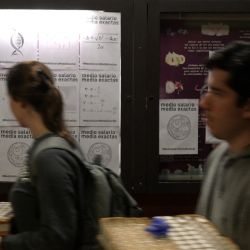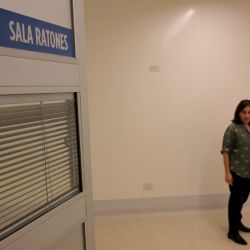Biochemist Alejandro Nadra worries that President Javier Milei's budget cuts will undo his scientific quest to unravel the cause of genetic diseases that disable and kill millions.
Since taking office last December, budget-slashing Milei has frozen public university and research budgets in Argentina, even as annual inflation stands at 236 percent.
This meant real spending on science and technology fell 33 percent year-on-year in August, according to the CIICTI (Centro Iberoamericano de Investigación en Ciencia, Tecnología e Innovación) research centre.
Nadra said he has already had to stop some of his experiments with the proteins responsible for gene mutations that cause diseases.
"We are on the verge of collapse," said Nadra from his laboratory at the Faculty of Exact Sciences of the University of Buenos Aires (UBA), home to three Nobel Prize laureates in science.
Along with artists, teachers, pilots, social workers and countless other professionals affected by Milei's drive to curb flyaway inflation and public debt, scientists fear for their future in Argentina.
"People are leaving, and they aren't applying for scholarships or teaching positions anymore because they can’t make a living," said Nadra.
Those who do often end up working in labs without the necessary equipment or supplies.
"If things don’t change, the time is near when everything disintegrates," said Nadra.
Nadra said he has not been able to buy anything he needs for his research since last November.
"So, if I run out of supplies, I either borrow from someone who still has some, or I stop doing those experiments."
The gross monthly salary of a research assistant today at Argentina's CONICET scientific research council is about 30 percent less – roughly US$1,180 – than a year ago, according to the RAICYT network science institutes.
Official data released last week by the INDEC national statistics bureau showed that 52.9 percent of people live in poverty today in Argentina.
'Drastic reduction'
Biologist Edith Kordon investigates breast cancer at the IFIBYNE state research institute dedicated to animal physiology, molecular biology and neurosciences.
"This is the first time this has happened to me. I mean, it has always been very hard to get funding, it has always been very hard to get scholarships, but now there is this practical certainty that we have nothing... I’ve never had so little money to do anything," she said.
Kordon and her team study similarities and differences between what happens in the normal mammary gland and breast tumours in order to find mechanisms to prevent or cure breast cancer.
She stresses that "the amount of money a scientific system needs to function well is small.”
Former science minister Lino Barañao (2007-2018) recently highlighted that even before Milei's cuts, Argentina spent about 0.31 percent of GDP on science compared to 1.21 percent in Brazil, 3.45 percent in the United States and 4.9 percent in South Korea. Today, it is even less, at about 0.2 percent.
"Never in the recent history of Argentina has there been such a drastic reduction in the [scientific] budget," Barañao told the La Nación newspaper.
In a more prosperous past, state funding of research had made possible the development of a transgenic wheat strain resistant to drought by a CONICET team led by researcher Raquel Chan, among other life-changing breakthroughs.
Last week, Milei's government adjusted CONICETs working budget upward to just over US$100,000 for 2024, a figure which physicist Jorge Aliaga considers "irrelevant" in its inadequacy.
"It doesn’t change anything," he told AFP.
In March, a group of 68 Nobel Prize laureates from around the world expressed concern in an open letter about Argentina's public research system approaching "a dangerous precipice."
Justifying the cuts, Milei hit out at "the so-called scientists and intellectuals who believe that having an academic degree makes them superior beings."
"If you think your research is so useful, I invite you to go out into the market like any other child of the neighbour, do your research, publish a book and see if people are interested or not, instead of hiding behind the coercive force of the state," said the President.
Nedra described those comments as “nonsense.”
“Historically all technological developments have been completely or to a large extent leveraged by the state,” he argued.
State support has permitted everything from the development of vaccines to antibiotics, such as Alexander Fleming's discovery of penicillin in the last century.
related news
by Tomás Viola, AFP
























Comments